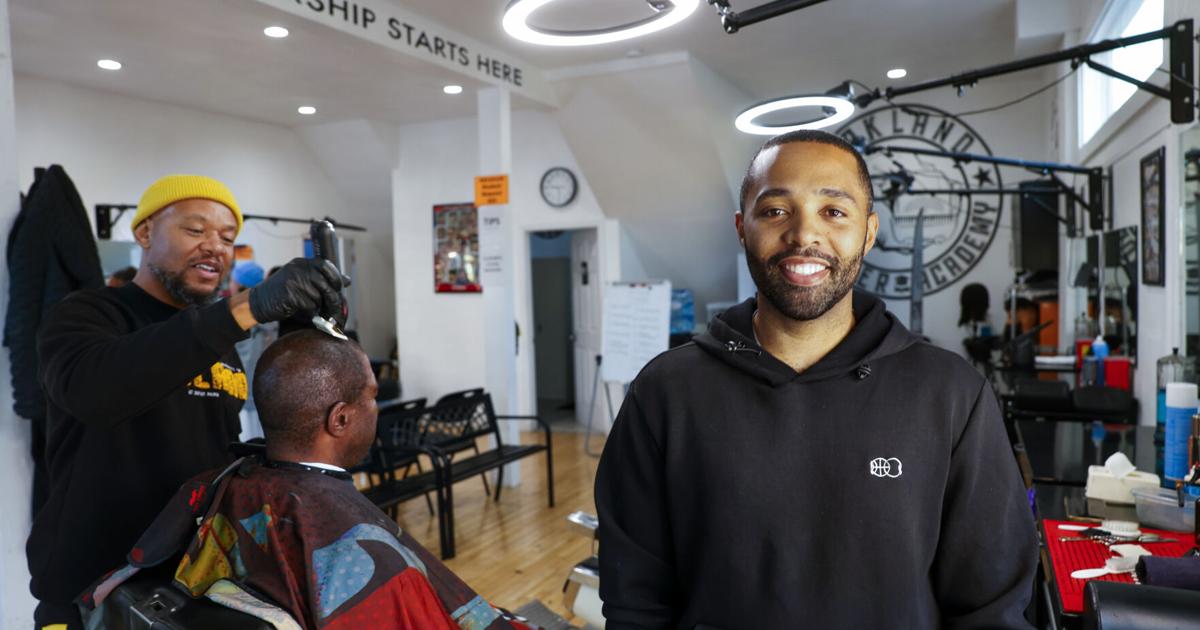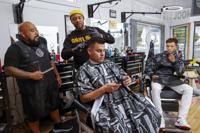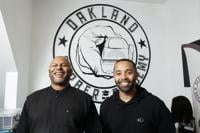Tech industry veteran Touré Owen is a serial entrepreneur, world traveler and Stanford business school grad.
But his true love is barbering.
“Once I retire … I just want to open a barbershop,” Owen said. “Because I still love cutting hair.”
That dream will have to wait for a bit. Right now, Owen is building a business that represents his attempt to meld his passion with his tech expertise and business savvy.
At the beginning of this year, he launched Bella, a company that offers a software-based service specifically designed to help barber and beauty schools enroll and track students, manage student accounts and comply with government regulations and accreditation services. Six schools have already signed on as clients, but Owen thinks that’s just the start.
With a backlog of potential customers hoping to sign up for his service, plans to broaden his offerings, including by incorporating an in-development artificial-intelligence agent, and a vision of eventually expanding to other kinds of vocational schools, Owen’s aiming to have 100 to 200 clients by the end of next year.
“It seems crazy [when] we’re like six now — six to 200 in one year — but that’s my goal,” he said.
Bella’s venture backers would be happy if the startup showed steady progress but only got partway to Owen’s target. But they’re confident he has what it takes to make Bella succeed.
Owen grew up in a single-family home in Sacramento. He didn’t initially go to an elite university after high school; instead, he went to Sacramento City College and worked full-time at Costco. Eventually he transferred to San Francisco State University, and from there to UC Berkeley, where he graduated.
After college, he joined Google, first in Mountain View, then in South Africa, heading up its African partnerships. Later, he studied for a master’s degree in global affairs at Tsinghua University; founded Colorwave, a nonprofit that helps tech workers from underrepresented communities get hired by Silicon Valley startups; and, during the COVID-19 pandemic, launched a mobile barbershop.
When that business failed, he enrolled in Stanford Graduate School of Business and a barber school at the same time.
Since he met Owen five years ago, Sean Mendy, a co-founding partner of Westbound Equity Partners, which led a $1 million funding round for Bella in January, has found Owen to be an independent thinker. Owen is someone who thinks through ideas himself, but isn’t afraid to acknowledge when he doesn’t know something, Mendy said.
He “has definitely earned everything he’s gotten,” Mendy said. “It’s been his performance and merit that’s gotten him into every door he’s walked through.”
Owen has long felt most comfortable walking through barbershops’ doors.
When he was a kid, the local shop served as a form of child care. His mom would drop his two brothers and Owen off on Saturday mornings, and they would spend six or seven hours there.
Customer Anthony Portillo gets his hair cut from student Efrain Vega (left), while instructor Ucal Lenard and student Christian Alston observe at Oakland Barber Academy at 5499 Bancroft Ave. in Oakland on Wednesday, Oct. 15, 2025.
Craig Lee/The Examiner
Barbershops are where he learned his culture, and they were always his safe space, he said. When he felt like a fish out of water, he sought out barbershops as a kind of refuge.
One time when he was working for Google in Mountain View — where he was one of only three Black people in his building — he got upset during a training session the company put on. After riding back home to San Francisco on the bus, he went immediately to his hole-in-the-wall barbershop.
“Just going there and getting a haircut just made me feel so much better,” he said.
Owen first tried to make a business around barbering during the early days of the pandemic. He had recently returned to the Bay Area from his master’s program in China because of the outbreak, and had taken a job at Amazon for the benefits. Because of the restrictions in place at the time, barbershops were closed, and he hadn’t gotten a haircut in a while.
One day in the spring of 2020, he went for a run around Oakland’s Lake Merritt and encountered one of his old barbers. The barber had set up shop by himself outside near the lake. Owen sat down for a haircut and came away with the inspiration to launch a mobile barber business of his own. He figured there were plenty of men just like himself who were yearning for a hair cut.
Owen researched the industry, bought a Mercedes Benz Sprinter van and customized it to suit his business, built a prototype app, hired barbers who were ready to get back to work, quit his job at Amazon and launched his business, which he dubbed Trimmed.
It ended up being a disaster. He knew nothing about running a business, so he was having to learn on the fly. He struggled with having to drive barbers around to customers for hours every day, finding places to park and a place to wash out the van each night.
Trimmed failed after two years, and Owen lost everything he had sunk into it — his life savings to that point.
“It was a terrible business. The business didn’t work,” Owen said.
But he loved the experience of watching the haircuts and observing customers’ interactions with their barbers.
“This is really special,” he said he thought at the time. “Like, the joy that customers get after getting their hair cut, the conversations they have.”
Owen said he struggled to figure out what to do next. He decided to enroll at Stanford GSB, where he had already been admitted but had deferred attending, because he didn’t have anything better to do. But he knew after his first day it wasn’t where he wanted to be or where he felt he belonged.
So, to kind of keep his sanity and his love of barbering alive, Owen decided his first week at business school to enroll in barber school as well. Before and after class and on the weekends, he learned how to cut hair. And he soon decided that when he graduated from GSB, he didn’t want to go back into the tech industry. Instead, he set his sights on barbering and owning his own shop.
Owen finished his business program at Stanford in December 2023. He didn’t finish his barber training until the following August; it takes 1,000 hours of training to get a license, and when he started, he was only going to barber school part-time.
Live entertainment, music, dancing and lots of colors are coming to The City
The 41-story project was unanimously endorsed Tuesday by the Board of Supervisors
Governor rejected a proposal that sought to protect kids, but advocates see hope in how he handled another AI-related measure
While training at the Oakland Barber Academy, he got to talking with the owner, Chris Colter, about the business and offered to help Colter with some of his administrative paperwork. Colter had started the school in March 2023 and was still in the process of establishing it and getting his accreditation, which is necessary to be able to accept students who require financial aid.
Colter turned Owen down at first, preferring to have a consultant he’d hired handle the paperwork.
But the more he talked with Owen and learned about him, including that Owen had graduated from Stanford’s business school and had spoken there about his experiences, the more comfortable he became with Owen helping him out.
“I’m like, ‘OK, this guy’s the real deal,’” Colter said.
Touré Owen trained as a barber Oakland Barber Academy at 5499 Bancroft Ave., pictured on Wednesday, Oct. 15, 2025.
Craig Lee/The Examiner
Colter ended up hiring Owen to help him put together an internal school study, a massive and critical document for schools applying for accreditation. Owen put it together without any problems, and the academy successfully completed that part of the process, Colter said.
While working with, learning from and observing Colter, Owen started getting the idea for Bella. He saw how much time Owen and other barber school owners were spending on their administrative responsibilities, such as tracking student attendance and the hours they were accumulating doing particular tasks or generating the reports they needed to file with the regulatory and accrediting bodies that oversee them. Barber and beauty schools in California report to four.
Barber school owners such as Colter handled their various administrative burdens in various ways. They’d often hire pricey consultants to generate the reports and paperwork, Owen said. Much of their data entry was done manually in spreadsheets or they created one-off forms in DocuSign. And they typically relied on student management software from legacy vendors that was difficult to use and hadn’t kept up-to-date with modern applications, he said.
Owen started working on a system that could digitize the enrollment process and use the data collected, which it would store in the cloud, to fill out the various documents schools need to file with regulators.
Instead of having students manually filling out multiple paper forms, which they then have to reenter or scan into a computer, schools with Bella can fill out information in a single online form, then turn that over to a student to complete virtually, before both sides sign it. After using the data collected to fill in the regulatory documents, the system has schools review and approve the data to make sure it’s correct.
The process of collecting the data and using it to populate documents is complex, but the underlying technology “is simple,” Owen said.
“The creativity and the value is applying it to a problem that is overlooked,” he said.
Not that Owen is shying away from more sophisticated technology. He used Loveable, an artificial intelligence-powered design and app-building service, to create mockups of Bella before he launched it. He has incorporated some AI elements into his service, using the technology to help check critical dates and to ensure that phone numbers are formatted uniformly, no matter how they’re entered.
Owen and his two employees are also working on a kind of AI chatbot that would be able answer students’ frequently asked questions about particular schools, based on those schools’ own information about costs and the like. They’re working on another that would be able to build a custom enrollment process for each school; right now, they have to do that manually.
Essentially the whole point of Bella is to save school administrators time so they can devote more time to their students, Owen said.
“That’s what we get really excited about,” he said.
So far, his customers are pleased with what he’s offering.
Before adopting Bella, Colter was using student management software called SMART his consultant had recommended and relying on paper forms. Now, he has digitized his enrollment process and said he finds Bella much easier to use.
“It’s kind of like the iPhone of student information systems,” he said.
Oakland Barber Academy owner Chris Colter, left, says Touré Owen won him over following initial skepticism.
Craig Lee/The Examiner
San Jose’s Educo Academy switched from a legacy system called Genesis to Bella earlier this month, said Jonathan “Riv” Rivera, one of the barber school’s owners. It took about a month to make the switch, in part because it wasn’t easy to get data out of Genesis, he said.
Bella isn’t a finished product, Rivera said. But it’s already saving him time and he likes Owens’ vision for it. He said Owen is in his school once or twice a week to help out with the system and get feedback.
“I really like looking at [Bella] and navigating through it,” Rivera said. “And also the direction they’re going, the vision they want to get to — I resonate with that.”
Both Rivera and Colter said a key test of Bella is coming soon. Both are going to need to use the system to generate crucial, mandated reports. But both believe in Owen and the system he has built.
“I’m confident Touré can get that done,” Colter said.
That kind of feedback is music to the ears of Brian Rumao, a managing director at Next Play Ventures, who invested in Bella in January alongside Westbound. Building a business like this can take years, but the early signs — such as the response from Bella’s initial target customers — are really positive, he said.
Owen is exactly the kind of founder Rumao said he likes to work with — someone who knows his industry intimately, someone who’s focused on an area that’s been overlooked or underserved, and someone who is coachable.
“If anyone is going to crack this, it’s going to be Touré, just given his background and his passion,” Rumao said.
So, running a barbershop will have to wait. For now, Owen has a business to build.
If you have a tip about tech, startups or the venture industry, contact Troy Wolverton at twolverton@sfexaminer.com or via text or Signal at 415.515.5594.







